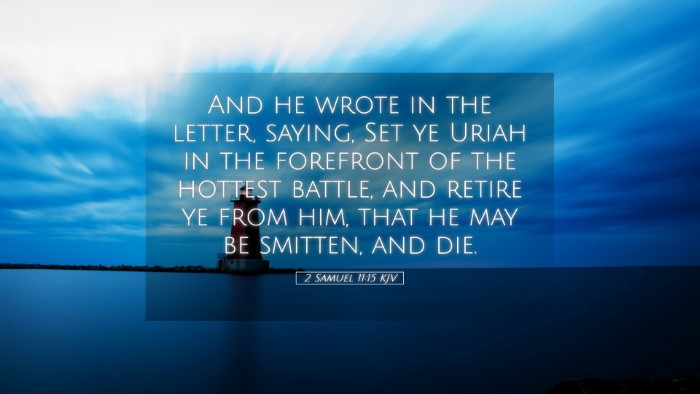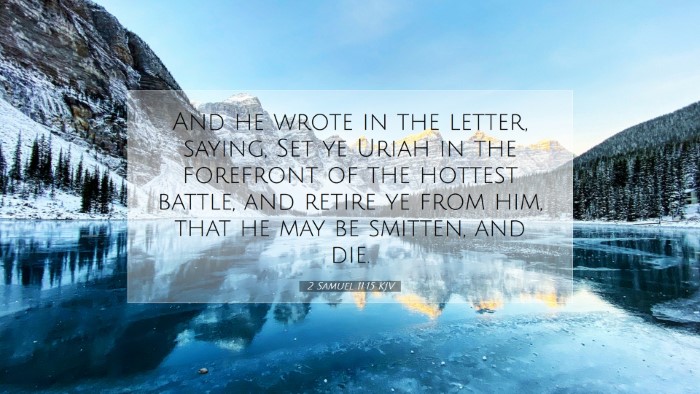Commentary on 2 Samuel 11:15
Verse: “And he wrote in the letter, saying, Set ye Uri to the front of the hottest battle, and retire ye from him, that he may be smitten, and die.”
Contextual Background
2 Samuel 11 narrates the tragic account of King David's sin with Bathsheba and the subsequent moral and ethical crises that ensue. This particular verse is pivotal, as it reflects the depths to which David sinks, illustrating the consequences of sin and the darker aspects of human nature.
Insights from Matthew Henry
Matthew Henry emphasizes the gravity of David's actions. In his commentary, he highlights that this verse exemplifies David's cold calculation and deliberate planning to cover his sin. Henry notes:
- Pre-meditation of Sin: David writes a letter, indicating this was not an impulsive act but a carefully thought-out plan to eliminate Uriah.
- Misuse of Power: As king, David abuses his authority, using his position to orchestrate Uriah's death, showing a stark contrast to God’s justice and mercy.
- Consequences of Sin: Henry points out that David’s attempt to cover this sin leads to further decay in his character and reign.
Observations from Albert Barnes
Albert Barnes contextualizes this act within the framework of biblical ethics and morality. He articulates several key points:
- Policy Over Principle: David’s actions reveal a shift from godly principles to a pragmatic approach to governance, leading to moral corruption.
- Desperation in Covering Sin: The letter serves as a grim reminder of how desperation can lead individuals to commit egregious acts.
- Uriah’s Loyalty: The contrast between Uriah's loyalty to David and David's betrayal is a poignant thematic element that Barnes highlights.
Reflections from Adam Clarke
Adam Clarke provides a deeper theological reflection on the implications of this verse. He observes that:
- Human Failings: This narrative captures the fallibility of even the greatest leaders and their susceptibility to sin.
- Divine Justice: Clarke indicates that such acts do not escape divine judgment, foreshadowing the consequences David would eventually face.
- Call to Repentance: He concludes with an admonition for leaders to seek accountability and to guard against moral compromise.
Theological Implications
This verse serves several critical functions in biblical theology:
- Sin and Its Consequences: It vividly illustrates the concept that sin inherently carries the seeds of its own destruction.
- Role of Leadership: Highlights the immense responsibility leaders hold; their choices can have devastating impacts on those they lead.
- Grace and Redemption: Ultimately, the narrative leads to themes of grace, showcasing God's ability to renew and restore even the most broken of lives.
Practical Application
For pastors, students, theologians, and scholars, this commentary serves as a reminder to:
- Examine Our Hearts: Regular self-reflection is crucial in maintaining integrity and righteousness in our lives and ministries.
- Consider the Impact of Our Actions: The consequences of our decisions extend beyond our immediate circumstances—recognizing this can foster a more responsible and ethical approach to leadership.
- Embrace God’s Grace: No action is beyond the reach of God’s forgiveness, but acknowledgment of sin is essential for restoration.
Conclusion
2 Samuel 11:15 is not just a narrative of betrayal and murder; it is a profound cautionary tale about the nature of sin and its ramifications in the life of a believer. Through the combined insights of Henry, Barnes, and Clarke, we are reminded of the complexities of human nature, the weight of leadership, and the inevitable call towards repentance and grace.


